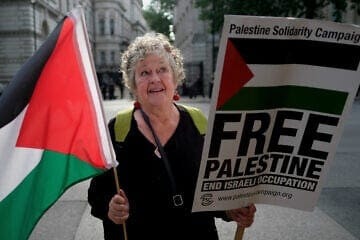As was the case a century ago, Western weakness and inconsistency in the face of terror, rarely leads to peace. Instead, it leads to more violence.
Ronen Itsik
(JNS)
It is astonishing and sometimes discouraging to see how history echoes itself in the formative events of our time.
Recent statements by various Western countries expressing their intention to recognize a Palestinian state coincide with an escalation in jihadist terrorism, mass demonstrations and the growing influence of anti-Israel lobbies in key European capitals and decision-making centers. This familiar dynamic, which we have seen recently in Spain, France and the United Kingdom, illustrates the way in which pro-Palestinian organizations operate in an organized manner to weaken Israel’s ability to act against the terror threats around it. In the United Kingdom, for instance, following months of large-scale pro-Palestinian protests and pressure from civil society organizations and cultural figures, it imposed an arms embargo on Israel.
Following the Balfour Declaration in 1917, which sought to lay the groundwork for a national home for the Jewish people in the Land of Israel, British authorities and the Jewish community were confronted by recurrent waves of violence initiated by the local Arab population.
The aim of this violence was clear: to destabilize the environment and force foreign powers to reconsider their stances. Major events, among them the 1929 Arab riots, led to political consequences such as the British government’s issuance of the 1939 White Paper. This document dramatically restricted Jewish immigration and land purchases, thus diluting the promise of Balfour and severely hampering the Zionist movement’s aspirations.
The logic was unmistakable: Resorting to violence as a response to unwelcome political developments, thereby exerting constant pressure on the international community to withdraw public support for the idea of a Jewish homeland, is effective.
More than 100 years after the Balfour Declaration, it feels as though Arab-Palestinian political movements and their extremist patrons are employing remarkably similar strategies. Every wave of escalation and every horrifying terror attack is rapidly followed by political rallies and massive supportive protests for the Palestinians in Europe’s power centers. These demonstrations attain significant media coverage, and prominent leaders often voice increased support for unilateral recognition of a Palestinian state. Ironically, this support often peaks at moments when violence and terror are at their worst.
This external pressure is explicitly designed to erode Western resolve and to amplify the tactic of “violence pays off” in the mentality of global jihadist actors. Even institutions associated with the European Union have warned against foreign-influence operations aimed at fueling protests, sharpening rifts and stoking public discourse—a backdrop that helps orchestrated campaigns shape narratives and decisions.
The European Union Action Service’s report “Foreign Information Manipulation and Interference (FIMI)” illustrates how such a campaign works. The report describes how foreign actors employ propaganda, disinformation and messaging systems to skew decision-making in the European Union, a framework that is consistent with a description of a planned campaign that exploits demonstrations and public discourse to skew political positions.
The political dynamic repeats itself: Radical groups employ unrest, whether through terror or aggressive activism, to undermine the sober judgment of Western leaders. This calculated pressure often leads governments to confer legitimacy at precisely the moments when violence and instability are peaking. For the extremist agenda, this is strategically advantageous as it reassures them that violence can set the international diplomatic agenda.
What history consistently teaches is that this pattern, Western weakness and inconsistency in the face of terror, rarely leads to peace or genuine reconciliation. Instead, it usually escalates the conflict, deepening divisions and prolonging the cycle of violence.
Moral and political courage is required to break the recurring fallacy that allows terror to wield a “veto power” over the rational diplomacy of Europe and the wider West. Unless the world internalizes the hard lessons gleaned from the past hundred years, it is bound to witness the cycle of history repeating itself yet again, this time with consequences that could be even graver for all parties involved. Recognizing these patterns is critical if we are to hope for a future that is not dictated by violence, but by logic, responsibility and genuine dialogue.
Image: An anti-Israel protester with a PLO flag opposite Downing Street in London, on June 5, 2018. Photo by Alisdare Hickson.


